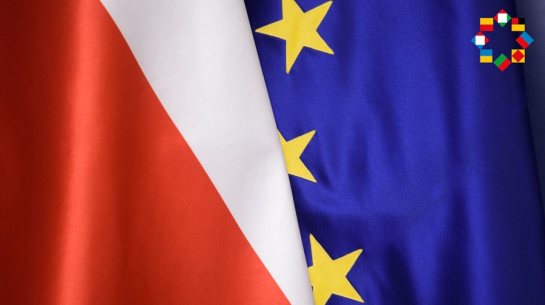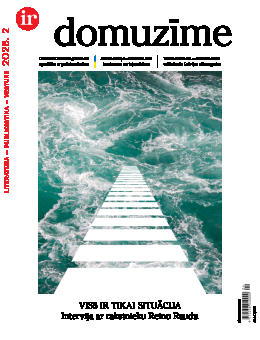Žurnāls Ir | Svarīgākais politikā, ekonomikā un kultūrā
Jaunākie raksti

Ko slēpj Rīgas rātes senie protokoli?
Par ko Rīgas vadītājiem bija jālauza galva pirms 400 gadiem? To palīdz uzzināt vecie Rīgas rātes protokoli, kuri tagad ir digitalizēti un pieejami pētniecībai visā pasaulē

VIDEO: Kā Polijas vēlēšanas ietekmēs Eiropu?
Polija gatavojas izšķirīgām vēlēšanām, kas varētu mainīt tās lomu Eiropā.
Sāc savu dienu ar uzticamu svarīgāko ziņu apkopojumu!
Īsi par svarīgāko ik rītu — pieraksties jaunumu vēstulei Ir Svarīgākais!

Ko neuzrakstīja Vāgners
Vācu režisors Matiass Hartmans Jaunajā Rīgas teātrī iestudējis Stāstu par Parsifalu kā aizraujošu vēstījumu par varoņa tapšanu

Līga Ābrama, brošu kolekcionāre
Ienākot Līgas Ābramas pagalmā, skatam paveras viena par otru greznākas dzintara, krāsainu stikliņu un dažādu veidu akmens brošas, kas uz sarkaniem samta spilventiņiem izliktas izrādīšanai uz galda, krēsliem un zālienā. «Nesen pārskaitīju — ir gandrīz četri tūkstoši!» viņa saka. Iespaidīgā kolekcija tapusi nepilnu astoņu gadu laikā — to pavisam nejauši aizsākušas divas vecmāmiņas dāvinātās dzintara brošas. Tolaik Līga bija aizrāvusies ar orhideju kolekcionēšanu, bet neesot līdz galam paticis, ka tās zied tikai dažus mēnešus gadā. «Tad es iedomājos — brošas arī ir skaistas kā puķes, bet tās atšķirībā no orhidejām nekad nenozied,» saka Līga.Laikā, kad dzima doma par brošu kol

Fitness smadzenēm
Tetovētājs Toms Kleins nepieķeras grāmatām, jo viņam svarīgākas ir no tām iegūtās zināšanas. Plauktā nonāk tikai izdevumi, kas patiesi aizrāvuši
Raidieraksti
Karikatūra
Personības
Viedokļi
Recenzijas


Izlasīt lugu šodien
Māra Ķimele Valmieras teātrī iestudējusi Gunāra Priedes lugu Zilā, pilnībā uzticēdamās aktieriem un viņu saskarsmei tieši «te un tagad»


Pētījumi
Eiropā
Bizness un ekonomika

Čalis ar apgriezieniem
Jānis Krēsliņš ir datorspeciālists, kura apskaņošanas un pasākumu tehniskā nodrošinājuma uzņēmums JKR Systems piedzima no viņa aizraušanās ar muzicēšanu. Tagad tas attīstās arī kā IT atbalsta sniedzējs

Kokkopības celmlauzis
Pirms 20 gadiem uzņēmējs Uģis Šmits sāka apgūt koku latīniskos nosaukumus un, bruņojies ar zāģi, sāka kāpt kokos, lai attīstītu arboristiku Latvijā

Savi kvalitātes principi
Kosmētikas uzņēmumā Labrains zinātne un skaistums iet roku rokā. «Mums ir svarīgi, ka visas izejvielas ir zinātniski pamatotas un ir pieejami ļoti daudz datu. Tikai tad esam gatavi tās testēt un iestrādāt savā produktā,» saka uzņēmuma vadītāja Līga Brūniņa
Populārākie raksti

Ko tagad dara Draugiem.lv radītājs Agris Tamanis
Sociālā tīkla Draugiem.lv, Latvijas pirmā vienradža Printful un citu veiksmīgu uzņēmumu līdzdibinātāju Agri Tamani vairs neinteresējot uzņēmējdarbība ar mērķi tikai pelnīt. Viņš iegulda dzimto Cēsu vecpilsētas atjaunošanā

Kā Markus Riva Talsu Balto kori aizveda līdz uzvarai
Dziedātājs Markus Riva (38) jeb Miķelis Ļaksa ar Talsu Balto kori uzvarēja šovā Koru kari. «Man tā ir nozīmīga uzvara, kas palīdz dziedēt pagātnes sāpes,» saka Miķelis. Izrādās, pat paša koristi sākumā nav ticējuši, ka viņš varētu būt labs kora vadītājs

Vēsturnieks Valdis Kuzmins: karš atgriezies mūsu realitātē
Karš kā valstu savstarpējo attiecību forma ir atgriezies mūsu realitātē. Pirmais solis uz gatavību tam ir apzināties, ka pašlaik neesam gatavi, secina vēsturnieks Valdis Kuzmins

Kā Mātes dienu svinēs trīnīšu Alisas, Marijas un Sofijas mamma Oļesja
Oļesja Pereverzeva (38) šopavasar pirmo reizi kļuvusi par mammu. Un uzreiz trim meitām! Lai arī sagurusi, viņa dzīvi joko un labprāt dalās pieredzē

Dārgas zāles. Kas kļuvis lētāks pēc reformas?
Kādi ir zāļu cenu reformas pirmie rezultāti? Veselības ministrija uzsver — recepšu zālēm cenas ir kritušās. Taču Ir pētījums atklāj, ka populārākie bezrecepšu medikamenti aptiekās tagad maksā vairāk

Četru bērnu tēvs, kurš mācās tango — mācītājs Rinalds Grants
Mācītājs Rinalds Grants (50) ir viens no diviem luterāņu arhibīskapa amata kandidātiem, bet pirms Lieldienām jautājam ne tikai par baznīcas lietām, bet viņa paša ticības ceļu, kas izrādās gluži neparasts










































